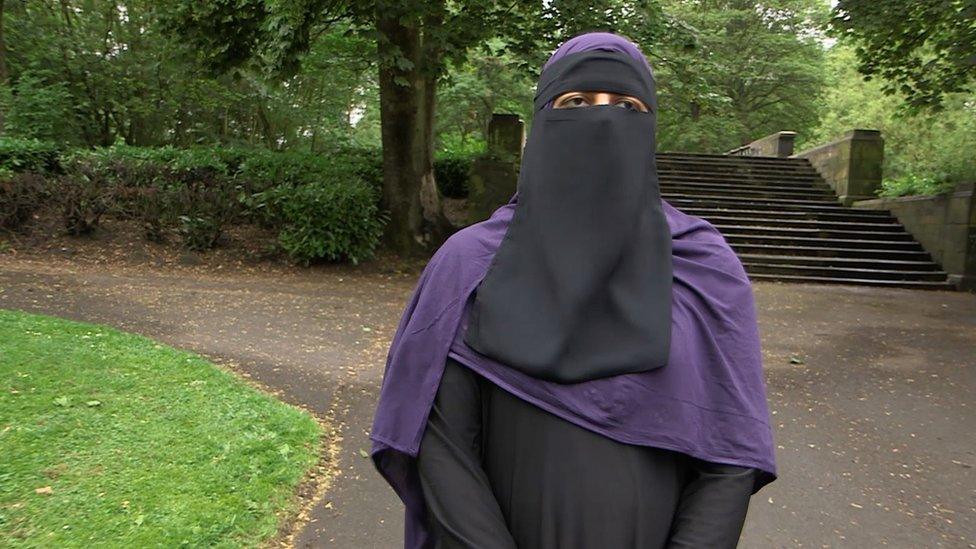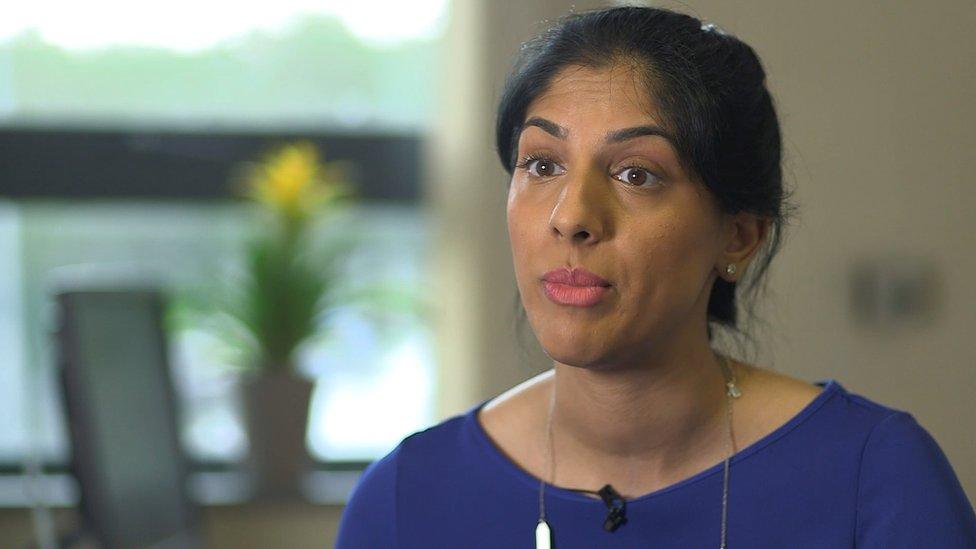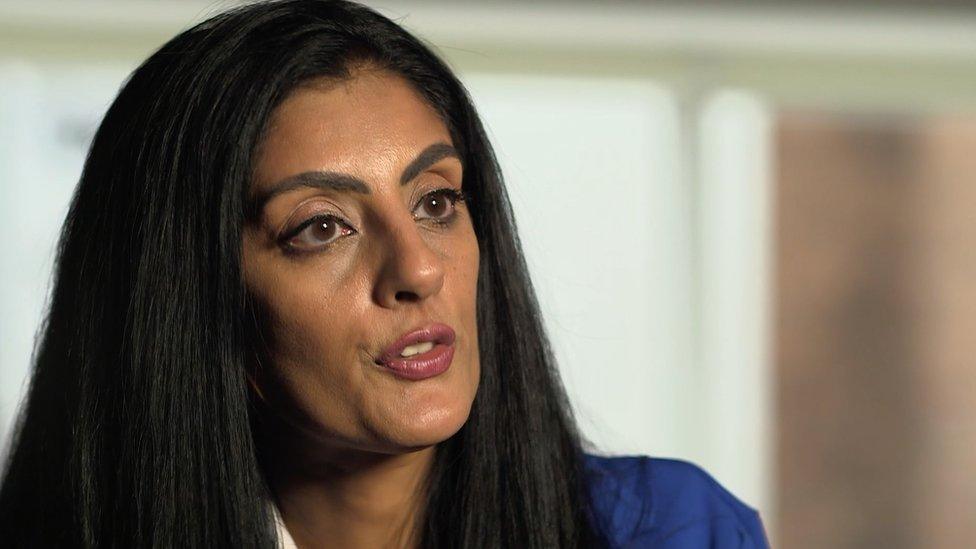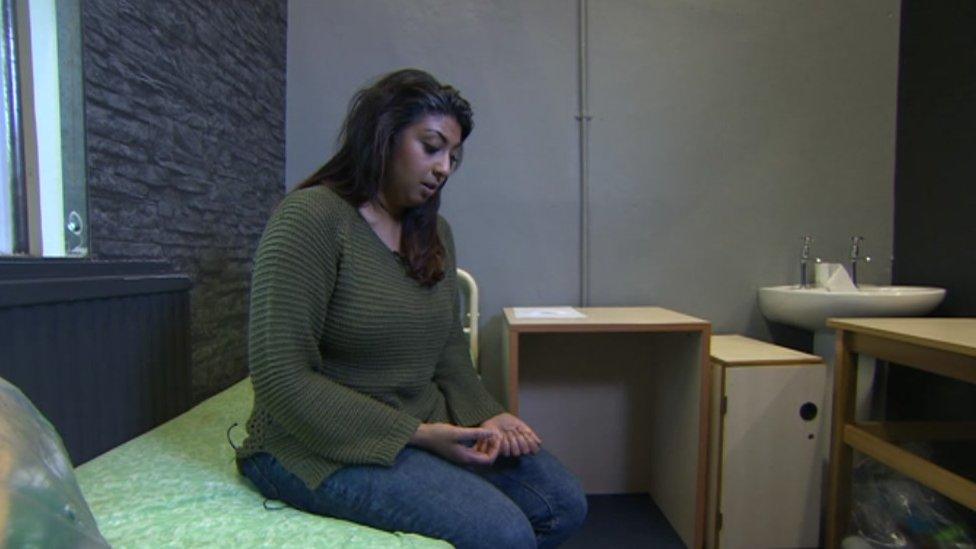Life after prison for Muslim women
- Published

'Najya' moved away from home because of the stigma she experienced
Female Muslim ex-offenders are struggling to cope with the stigma of having served time in prison, it's claimed, with some being disowned by their family, and others unable to rebuild a future for themselves and their children. Now there are calls for them to receive more targeted support.
"There was a moment when I thought, 'I want to be back in prison', because I found it so difficult on the outside," says Najya - whose name has been changed to protect her identity.
She served three years in jail, but says she feels as if she is still serving her sentence - due to the shame she has experienced within her community.
She says she found it difficult to leave the house because of the disapproving looks she would receive from others, despite having the support of her husband. She experienced anxiety attacks.
She says she would make up an excuse not to go to the shops, afraid someone would recognise her.
"These little things just build up and build up," she explains.
And there was no-one she felt able to turn to for support.
"Who do you tell? What do you say? You can't talk about things like that because they'll never understand.
"Our community finds it so difficult to talk about normal issues... and this is a taboo subject."
Najya regrets her actions, but believes it is unfair that while men are welcomed back into the community following a crime she has felt the need to leave the area.
"I've made a mistake. I don't want sympathy... but I do need support," she explains.
'Safe environment'
Najya is now living in Bradford, having been supported by the Muslim Women In Prison Project - based in the city.
The rehabilitation programme focuses on the specific cultural needs of Muslim women - many of whom do not have contact with friends or family, and has supported 55 women in the past 12 months.
By doing so, it is able to support women who may not feel comfortable seeking more general services.
It took Najya a year to find the courage to travel to Bradford for support.
She remembers waiting outside in the car as the minutes ticked by, gathering her thoughts, before she went into the centre.
"Everything just came back to me," she says. "I just thought, 'They're going to start judging me.'"
But since that moment, she says, it has become a safe environment where she feels free to open up - compared with life in the wider community where, she says, women are told, "Don't talk about it, stay quiet."
The counselling provided has given Najya the chance to rebuild her life and find employment.
Another woman at the centre said she believed she would be homeless without its support.

Sofia Buncy says 70% of women at the centre have moved on to a course or into employment
The programme is run by Sofia Buncy, who describes it as a "one-stop shop" for services such as housing and benefits support.
Ms Buncy says it is a model that has proved successful, with 70% of women having been accepted on to a course or moved into employment.
In a new report, she is now calling for more support for female Muslim ex-offenders, a focus on helping women to be reunited with their families, and more diversity within the make-up of the criminal justice system.
It comes as Labour MP David Lammy, who has chaired an inquiry into the treatment of black and minority ethnic communities in the criminal justice system, says a separate inquiry should be carried out into the needs of minority women - especially those of Muslim faith - in prison.
Statistics from the Prison Reform Trust, from March 2019, show there are 226 Muslim women in UK prisons, accounting for 6% of the female prison population of 3,832 women.
The Ministry of Justice said it was "shifting focus towards tailored community-based support... [and] investing £5 million in locally-led community services that benefit not only offenders, but their families and the wider community".

Yasmin says the taboo around Muslim women in prison needs to be broken
Yasmin, from Birmingham, was released from prison after serving two years inside for possession of drugs - something she regrets.
She now works for an agency helping offenders on probation.
"There are loads of [general] agencies in Birmingham," she explains, "but with our culture differences, there needs to be something in place for Muslim women so they can understand and explain what they have to go through."
For her, one of the most important goals is to have open conversations on the subject, to break the taboo.
"Why shouldn't I talk about it?" she asks, rhetorically.
"We need mothers and fathers to understand this can happen to anybody."
Her own mother, she adds, used to tell people Yasmin was "out of town working", to conceal the fact that she was in prison.
Forgetting past mistakes
Yasmin wishes she had had the opportunity to access the same support provided in Bradford to women like Najya - for whom it really was the key to moving on from past mistakes.
Najya says she "just couldn't believe there was a service that provided somebody that cares and understands my culture.
"Because if you don't understand my culture, you're not going to understand what's going on in my head."

Follow the BBC's Victoria Derbyshire programme on Facebook, external and Twitter, external - and see more of our stories here.
- Published14 March 2017
